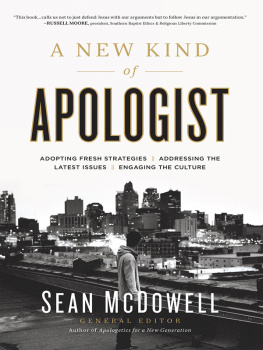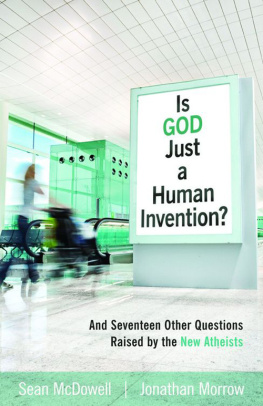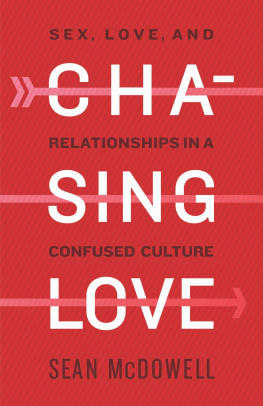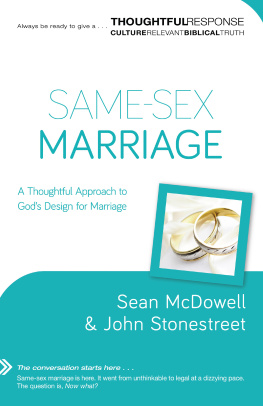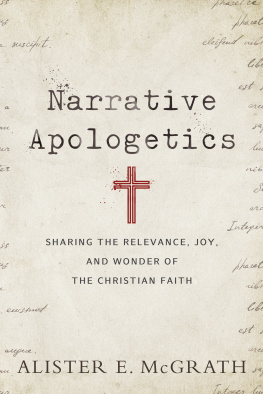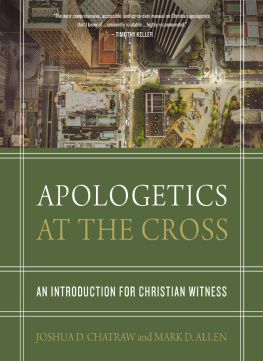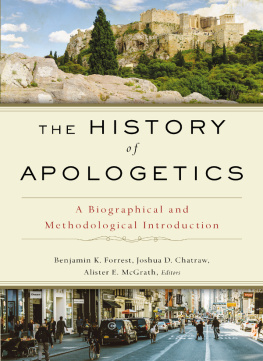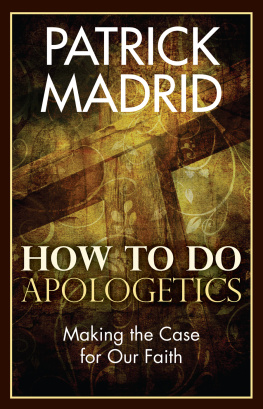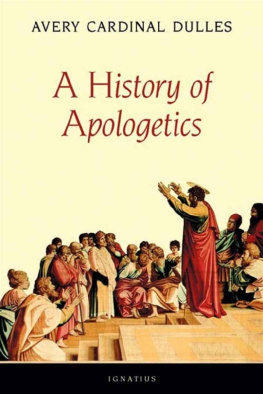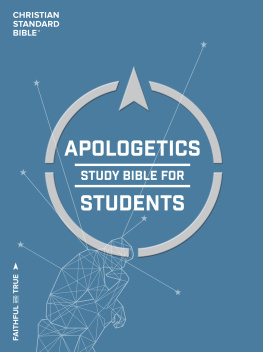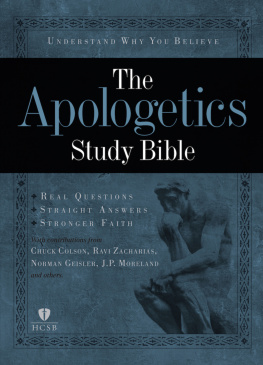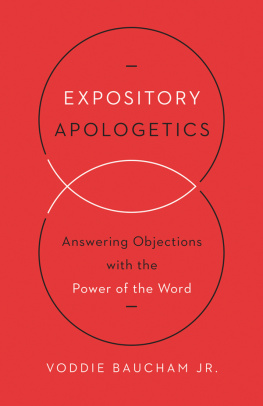

HARVEST HOUSE PUBLISHERS
EUGENE, OREGON
Unless otherwise indicated, all Scripture quotations are from the ESV Bible (The Holy Bible, English Standard Version), copyright 2001 by Crossway, a publishing ministry of Good News Publishers. Used by permission. All rights reserved.
Verses marked NIV are from the Holy Bible, New International Version, NIV. Copyright 1973, 1978, 1984, 2011 by Biblica, Inc. Used by permission. All rights reserved worldwide.
Verses marked NASB are from the New American Standard Bible, 1960, 1962, 1963, 1968, 1971, 1972, 1973, 1975, 1977, 1995 by The Lockman Foundation. Used by permission. (www.Lockman.org)
Verses marked NLT are from the Holy Bible, New Living Translation, copyright 1996, 2004, 2007, 2013 by Tyndale House Foundation. Used by permission of Tyndale House Publishers, Inc., Carol Stream, Illinois 60188. All rights reserved.
Cover by Dual Identity, Inc,
Cover photo Brayden Heath / Lightstock
A NEW KIND OF APOLOGIST
Copyright 2016 Sean McDowell
Published by Harvest House Publishers
Eugene, Oregon 97402
www.harvesthousepublishers.com
Library of Congress Cataloging-in-Publication Data
A new kind of apologist / Sean McDowell, PhD, general editor.
pages cm
ISBN 978-0-7369-6605-4 (pbk.)
ISBN 978-0-7369-6606-1 (eBook)
1. Apologetics. 2. Christianity and culture. I. McDowell, Sean, editor.
BT1103.N484 2016
239dc23
2015021781
All rights reserved. No part of this electronic publication may be reproduced, stored in a retrieval system, distributed, or transmitted in any form or by any meanselectronic, mechanical, digital, photocopy, recording, or any otherwithout the prior written permission of the publisher. The authorized purchaser has been granted a nontransferable, nonexclusive, and noncommercial right to access and view this electronic publication, and purchaser agrees to do so only in accordance with the terms of use under which it was purchased or transmitted. Participation in or encouragement of piracy of copyrighted materials in violation of authors and publishers rights is strictly prohibited.
To my son, Shane.
I pray that you will be the kind of apologist that your generation needs.
I love you and am so proud of you.
Contents
SEAN MCDOWELL
TIM MUEHLHOFF
BRIAN AUTEN
TOM GILSON
MARK MITTELBERG
KEN WYTSMA AND RICK GERHARDT
DAN KIMBALL
JEFF MYERS
BRETT KUNKLE
DERWIN L. GRAY
HOLLY ORDWAY
LENNY ESPOSITO
CHRISTOPHER BROOKS
TERRY GLASPEY
MATTHEW ANDERSON
MARY JO SHARP
JENNIFER A. MARSHALL
MICHAEL LICONA
JONATHAN MORROW
JAY W. RICHARDS
JOHN STONESTREET
GLENN T. STANTON
ALAN SHLEMON
JAMES TONKOWICH
CASEY LUSKIN
SCOTT SMITH
ABDU MURRAY
TANYA WALKER
SEAN MCDOWELL
D uring a trip to Breckenridge, a beautiful ski town in the mountains of Colorado, a friend and I decided to get our hair cut at one of the little shops downtown. As we waited our turn, I read another chapter of the book I had brought along with me, a book whose title clearly indicated my interest in spiritual things.
When my turn came and I settled into the chair, the young hairstylist noted that I was reading a Christian book and wondered if it would be okay for her to ask me a question about God that had been on her mind. Of course I said yes, relishing the opportunity to talk about theology. After all, I had been studying apologetics and was ready with all the right answers. Bring it on , I thought, smiling to myself.
Well, she started, with just a hint of hesitation, why does God allow so much evil and suffering in the world?
Really, thats all you got? raced through my mind. Why is this such a big problem? Its one of the most oft-asked questions in apologetics, and I was ready with the classical free-will defenseemphasizing that God desires a relationship with us, which is possible only if we have free will. I made the point that evil can exist only if there is first a standard of objective good and there can be good only if there is a God. In other words, her very question, I pointed out, presupposes the existence of God.
This led to more questions, and I found I could answer each one pretty easily. Shed ask a question, and I had an answer ready at hand.
Things were going extraordinarily well, I thought, until she paused for a long moment, lifted the scissors away from my head, and then began to cry. She stepped back from cutting my hair and said in a quavering voice, This is a bunch of bs! Youve got an answer for everything. It cant be that easy. You just dont understand.
I was speechless (and a bit nervous, since she was clearly upset and had very sharp scissors poised not far from my head).
What had just happened? It seemed like we were having a great conversation and now this. Well, I quickly changed the topic and made sure to give her a big tip on the way out. Outside the shop, I turned to my friend and asked him why he thought she had been so defensive. He took a deep breath and looked me in the eyes, probably trying to determine if I was ready to hear the truth.
Well, he said, as gently as he could manage, do you have any idea how arrogant you were toward her?
I was taken aback. But as we walked along the streets of Breckenridge, I thought about the encounter and realized he was absolutely right. Rather than really listening to her, asking questions, and trying to learn from her, I was more interested in scoring points and winning the argument. My replies had come across as prepackaged sound bites rather than compassionate and respectful responses. What I saw, maybe for the first time, is that truth must be wedded to grace, and that what we say is important but how we say it is equally critical.
If we have the best arguments but not love, our arguments will often fall on deaf ears (1 Corinthians 13:1-3). A new kind of apologist must have both truth and love. This is why the apostle Paul said,
And the Lords servant must not be quarrelsome but kind to everyone, able to teach, patiently enduring evil, correcting his opponents with gentleness. God may perhaps grant them repentance leading to a knowledge of the truth, and they may come to their senses and escape from the snare of the devil, after being captured by him to do his will (2 Timothy 2:24-26).
Whenever the problem of suffering and evil come up, I try to avoid simple answers. I typically respond with a question: Of all the things you can ask about God, why that one? Occasionally people have a genuine intellectual issue they want to wrestle with, and I am more than happy to help. But more often than not, the intellectual question masks a deep personal wound. When I ask this question, I often hear painful stories of sickness, broken relationships, and abuse. The Christian response is not to simply give a reason, although there may come a time for that, but to weep with those who weep (Romans 12:15) and to show comfort and care to the afflicted (Psalm 82:3).
Next page
